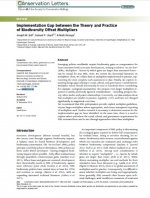Implementation Gap between the Theory and Practice of Biodiversity Offset Multipliers
By Joseph W. Bull, Samuel P. Lloyd, Niels Strange - Department of Food and Resource Economics & Center for Macroecology, Evolution and Climate, University of Copenhagen, Department of Zoology, University of Oxford, Department of Food and Resource Economics & Center for Macroecology, Evolution and Climate, University of Copenhagen View PublicationEmerging policies worldwide require biodiversity gains as compensation for losses associated with economic development, seeking to achieve no net loss (NNL). Multipliers factors by which gains are larger than associated losses can be crucial for true NNL. Here, we review the theoretical literature on multipliers. Then, we collate data on multipliers implemented in practice, representing the most complete such assessment to date. Finally, we explore remaining design gaps relating to social, ethical, and governance considerations.
Multiplier values should theoretically be tens or hundreds when considering, for example, ecological uncertainties. We propose even larger multipliers required to satisfy previously ignored considerations including prospect theory, taboo trades, and power relationships. Conversely, our data analyses show that multipliers are smaller in practice, regularly <10.0, and have not changed significantly in magnitude over time. We recommend that NNL policymakers provide explicit multiplier guidelines, require larger multipliers where appropriate, and ensure transparent reporting of multipliers used. Further research is necessary to determine reasons for the implementation gap we have identified. At the same time, there is a need to explore when and where the social, ethical, and governance requirements for NNL reviewed here can be met through approaches other than multipliers.

